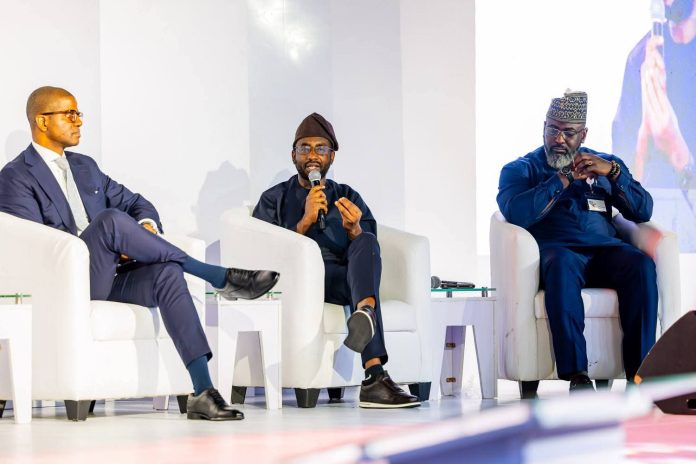By Emmanuella Oghenetega
Kashifu Inuwa Abdullahi, the Director General of the National Information Technology Development Agency (NITDA), while reaffirming Nigeria’s commitment to digital literacy, has stated that it is a key driver of economic growth, social inclusion, and national prosperity, and, that no meaningful digital economy can thrive without it.
Delivering a presentation titled “Nigeria’s Journey to a Digital Economy” at the BusinessDay CEO Forum, held in Lagos under the theme “From Reforms to Recovery,” Inuwa spotlighted the Digital Literacy for All (DL4ALL) Initiative, an ambitious national programme aimed at achieving 70 percent digital literacy by 2027 across all sectors of the Nigerian economy.
And according to him, is laying the groundwork for a resilient, tech-driven future in the country.
He stated that, “Digital literacy is the foundation of our digital economy. It is not just about knowing how to use devices or apps, it is about empowering people to unlock opportunities for entrepreneurship, job creation, and economic participation.”
He explained that the DL4ALL Initiative targets Nigerians from all walks of life, including those in schools, offices, marketplaces, and underserved communities, with a view to bridging digital gaps and driving inclusion.
He expounded, that the initiative is designed to provide people with essential digital skills through mobile literacy campaigns, community training hubs, and accessible online platforms.
“Our goal is simple yet transformative, to ensure every Nigerian, whether in urban or rural areas, has the digital skills required to thrive in the modern economy. A digitally literate nation is a prosperous nation,” he said.
Reflecting on Nigeria’s digital evolution, Inuwa traced the country’s journey back to 2001, when the first National IT Policy was introduced and NITDA was established. At that time, less than 500,000 Nigerians had access to computers, and the ICT sector contributed less than 0.5 percent to the country’s GDP. Today, he noted, the story is remarkably different, with over 130 million Nigerians having internet access and ICT now contributing more than 17 percent to the national GDP.
Inuwa outlined the strategic pillars guiding NITDA’s digital transformation, namely; Foster Digital Literacy and Cultivate Talents; Build a Robust Technology Research Ecosystem; Strengthen Policy Implementation and Legal Framework; Promote Inclusive Access to Digital Infrastructure and Services; Strengthen Cybersecurity and Enhance Digital Trust; Nurture an Innovative and Entrepreneurial Ecosystem; Forge Strategic Partnerships and Collaboration; and Cultivate a Vibrant Organisational Culture and an Agile Workforce in NITDA.
During a high-level panel session titled “Builders of the New Nigeria – Stories of Scale, Grit, and Innovation” Inuwa, called on business leaders to embrace artificial intelligence (AI) as a collaborative partner in driving innovation and economic growth, rather than viewing it as a threat to human jobs.
He challenged the conventional notion of AI as merely an automation tool, and encouraged CEOs and business leaders to view AI as a thought partner and a strategic ally in generating innovative ideas, discovering new business models, and creating competitive advantages in a rapidly evolving global economy.
“I see artificial intelligence not just as a tool, but as a thought partner,” he said, urging business leaders to integrate AI into their operations not as a replacement for human input, but as a collaborator that can unlock new levels of productivity and creativity.
He explained that while AI can outperform humans in certain tasks, its primary function should not be seen as replacing human workers.
Instead, it is poised to take over specific processes and skills currently relied upon to accomplish routine tasks. This shift, according to him, requires business leaders to reposition themselves at the center of this technological evolution.
“The key is to position yourself at the center of this collaboration. Yes, AI can outperform humans in many tasks, but it will not replace you or me. What AI will replace are the skills and processes we rely on today to perform our work.”
Throughout the session, panelists shared personal stories of perseverance, discussed strategies for business growth, and explored how technologies like AI, digital payments, and data analytics are shaping Nigeria’s future economy.


